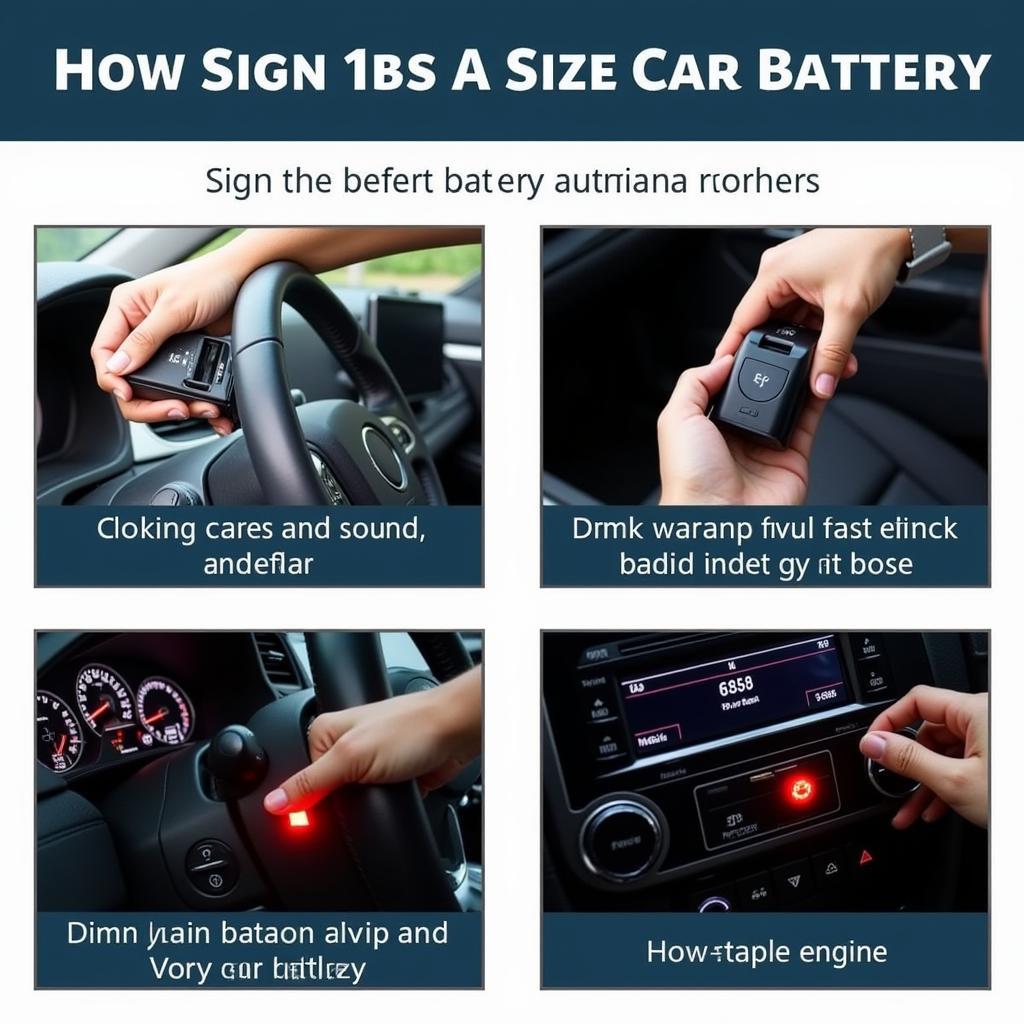A dead car battery and a faulty alternator share similar symptoms, making it tricky to pinpoint the culprit when your car won’t start. This article will equip you with the knowledge to distinguish between a dead car battery vs alternator problem, saving you time, money, and potential roadside frustration. We’ll explore the functions of each component, common symptoms, diagnostic tests, and solutions. signs of battery problem in car
Understanding the Roles of Your Battery and Alternator
Your car’s battery and alternator work together in a symbiotic relationship. The battery provides the initial jolt of electricity to start the engine. Once the engine is running, the alternator takes over, recharging the battery and powering the vehicle’s electrical systems, such as headlights, radio, and air conditioning. Understanding this interplay is key to diagnosing whether you’re dealing with a dead car battery vs a faulty alternator.
The Battery’s Job
The battery’s primary role is to provide the initial power surge needed to crank the engine. It also acts as a reservoir of power for accessories when the engine is off. Think of it as the starter for a race – it gets things going but isn’t responsible for sustaining the run.
The Alternator’s Task
Once the engine is running, the alternator becomes the primary power source. It generates electricity to keep the engine running, recharge the battery, and power all electrical systems. The alternator is like a marathon runner, providing consistent power for the long haul.
Identifying a Dead Car Battery
A dead battery often presents itself with distinct symptoms. The most common sign is a clicking sound when you turn the key, indicating insufficient power to start the engine. Dim headlights, especially when the engine isn’t running, can also be an indicator. Other signs include slow cranking and interior lights that are weaker than usual. my car battery keeps going flat
 Dead Car Battery Symptoms
Dead Car Battery Symptoms
Spotting a Faulty Alternator
A malfunctioning alternator can manifest in various ways. One of the most telling signs is a battery warning light illuminating on your dashboard. Other indications include dimming headlights while driving, flickering interior lights, and unusual noises coming from the engine compartment, like whining or grinding. Sometimes, a faulty alternator can even lead to a dead battery, as it’s unable to recharge it. 2017 jeep grand cherokee battery problems
Diagnostic Tests: Dead Car Battery vs Alternator
There are a few simple tests you can perform to help diagnose the problem. A multimeter can be used to check the battery’s voltage. A healthy battery should read around 12.6 volts. A lower reading suggests a dead battery. For the alternator, you can check its voltage output while the engine is running. It should be around 13.5 to 14.5 volts.
Solutions and Next Steps
If your battery is dead, jump-starting the car is a temporary solution. However, you’ll likely need a new battery if it doesn’t hold a charge. For a faulty alternator, replacement is usually the best course of action.
“A reliable battery and alternator are essential for a smoothly functioning vehicle. Regular checks and timely replacements can save you from unexpected breakdowns,” advises John Miller, Automotive Electrical Systems Specialist at Miller Auto Electric. He further emphasizes, “Don’t underestimate the importance of routine maintenance. Addressing minor issues before they escalate can prevent costly repairs down the road.”
Conclusion
Distinguishing between a dead car battery vs alternator issues is crucial for effective troubleshooting. By understanding the symptoms and performing simple diagnostic tests, you can quickly identify the problem and take appropriate action. Remember, proactive maintenance is key to a healthy vehicle. flat car battery installing xm radio in car
FAQ
- Can a bad alternator drain my battery? Yes, a failing alternator will not recharge the battery properly, eventually leading to a dead battery.
- How long does a car battery last? Typically, a car battery lasts between 3 and 5 years.
- What causes an alternator to fail? Common causes include worn-out brushes, faulty diodes, and damaged bearings.
- Can I drive with a bad alternator? You can drive a short distance, but the battery will eventually drain, causing the car to stall.
- How much does it cost to replace a car battery? The cost varies depending on the type of battery, but it typically ranges from $50 to $200.
- How much does it cost to replace an alternator? The cost of replacing an alternator can range from $300 to $700, depending on the make and model of your car.
- What are the signs of a bad battery? Some common signs include slow cranking, dim headlights, and a clicking sound when trying to start the car.

